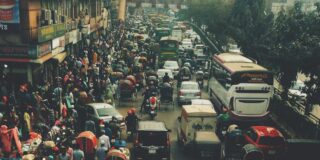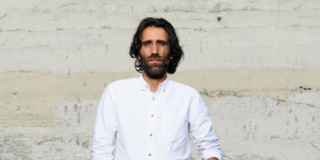Thanks to our friends at Voiceworks we’re pleased to present the following article by Bridget Chappell, a young Australian writer, on the criminalisation of sex work in Iraqi Kurdistan. As Chappell points out in her piece, one of the major arguments put forward to justify the invasion of Iraq in 2003 was widespread human rights abuses, especially against women. Eight years on, the success of the invasion, including Australian support and involvement, very much remains an open question. This article originally appeared in Voiceworks #85 “Other”.
The guards of Sulaimaniya Prison women’s wing wear high heels.
A small wing; homier in demeanour than its adjacent counterpart for male prisoners. Glimpses of men, slumped and crowded, sneak past me on the way in. It’s reminiscent of that public transport feeling. No-one’s sure of what to do with their eyes.
Hana Baradost is the chief of the female inmates’ wing of what is officially known as Sulaimaniya Directory of Arrest, Iraqi Kurdistan. She is spreadeagled contentedly across the armchair flanking the large desk in her private office; the plastic palmfronds in the corner, her blue camouflage suit and the communist-era military cap perched atop her piled black locks form a composition of years gone by.
I am the flat-soled, notebook-wielding visitor today: that alone makes me a Z-grade celebrity, calling in the hopes of penning something on the women in her charge. I feel my privilege press uncomfortably against the walls of the room; I’m trying to get comfortable in my seat.
The guards of Sulaimaniya Prison women’s wing wear high heels.
The women’s wing of the prison was established following the 1991 Kurdish uprisings against the national government of Saddam Hussein. Now with Iraq torn between violence and upheaval in the south and frenzied, potholed development here in the north, this prison represents not only the tragedies, but also the strange and often conflicting social changes that have gripped Iraq. Baradost pauses as she tries to recall what was done with female prisoners before 1991. ‘Women weren’t criminals back then’, she says simply. ‘Society was different, we were confined to traditional roles. Nobody would have allowed for it.’
The capacity for criminal activity increases with personal liberty, and these women have been brought here by their transcendence of domesticity.
We climb the stairs from Baradost’s office to the second floor. ‘They can request books or newspapers if they want,’ Rewan Rozaki, the visiting social worker from Khanzad Women’s Centre, tells me. It is because of her that I am here. ‘However, many of the women who come here are illiterate.’ The unmistakeable pitter-patter of children’s feet resonates on the landing as three small, curious faces appear above me. ‘Mum! It’s visiting time!’ they call out in Kurdish.
‘Women weren’t criminals back then’, she says simply.
Prisoners are divided according to crime. Cell 446 – theft, or Charge 446 under Iraqi law – is filled with the eyes of two women who stare back at this new intruder. Rozaki tells me that one was caught stealing from the markets, the other from the government. There’s no time to find out who’s who, it seems, and I’m too shy to ask. We follow the kids into Cell 406 – murder – the young ones darting between the legs of four women adorned in velvet floor-length gowns. The father is dead, and all the family are suspects. They have been here for five months.
Three women are currently held in Cell 407, for prostitution. Shokhan is twenty-seven and from Dukan, a Kurdish city in Sulaimaniya governorate. She stands a head taller than I and has the kind of jaw that says ‘don’t fuck with me’. She’s happy to talk; I’m grateful. Orphaned at a young age, she says she has lived on the streets and been in and out of detention as long as she can remember. This is her first time being charged for leshfrosh – literally ‘sell body’ in Kurdish.
‘I was arrested at a bus station,’ she says. When asked where she will go when she is released from prison, she answers that she doesn’t know. ‘I can’t go back to my family. There is a special kind of stigma of this crime. It means I can hold no place in society.’
It is not hard to imagine that women arrested for prostitution in Iraq have very few options available to them once released, with even the few women’s shelters that have opened in Kurdistan since 1991 offering only limited assistance. ‘Usually we can’t admit prostitutes to the program at our center,’ says Rozaki. ‘No shelter does. There have been too many cases of women trying to recruit others to their ring.’
Prison itself also serves as a recruiting ground. Young girls imprisoned for the first time may often meet women intermediaries who are detained for pimping. Once aided in bail funds, the girl is trapped into working for the Arab or Kurdish madam to pay off the debt. The prostitution rings operate out of homes or shanty towns run by the madam, whose women in turn recruit others. The madams are not ultimately in charge of the operation, requiring the protection and backing of a male pimp, without whom the madam could not even rent an apartment in her name.
Madams are inevitably prostitutes themselves who have managed to transcend standard roles by becoming recruiters for the industry. Many operate out of beauty parlours and bus stations, on the lookout for young girls that may be orphaned or on the run from their husband or family. Satellite TV porn channels are used to groom new recruits, also playing a powerful role in shaping the male demand for sex. Clients come from different backgrounds: government officials, businessmen and tribal men. Intellectuals and farmers, students and labourers. Many are married and go to brothels during the day.
Feminists taking an abolitionist position on prostitution have contributed to forging a synonymity in our minds between prostitution and exploitation – which overlooks a vast number of people in the sex industry around the world who have based their participation in it on informed choices. This outlook also propagates what is denounced by advocates of sex workers’ rights as the ‘good girl’/’bad girl’ duality of a female identity of patriarchal construction. I am not from this camp of feminists and am not here to judge those I meet.
A distinction remains to be made however between prostitution in general and forced prostitution, an issue addressed by Kurdish activist Khandan Hama Jaza, author of the 2007 study of prostitution in Iraqi Kurdistan, An Ocean of Crime. Jaza states that ‘I have interviewed a lot of prostitutes in Europe. I can say that 90 per cent of them are doing it willingly. But 98 per cent of Kurdish women involved are victims. During fifteen years of investigation, I have interviewed more than 1,300 prostitutes and only three women have said to be sex workers of their own accord.’ Jaza was forced to flee to Germany last year when severe social backlash against the book led to the kidnapping of her husband and attempted kidnapping of her daughter.
Jamila and I exchange glances. We are the same age.
But the meaning of these numbers is not clear. How does one measure the statistics of victimhood? How did Jaza draw such black and white conclusions from her subjects, and who exactly did she interview beyond Kurdistan’s undrawn borders? In Europe, where a far more extensive body of research on sex work exists, an average of 47-50% of workers are migrants, according to a 2009 TAMPEP report on sex work in Europe. The correlation between migrant sex work and exploitation is illustrated in the same report, which documents higher rates of HIV risk and violence, discrimination and social exclusion of migrant workers in comparison to nationals.
Twenty-three-year-old Jamila from Baghdad joined Kurdistan’s bottom rung last year, working in Sulaimaniya for six months before her incarceration. ‘I came because there was no work in Baghdad’ says Jamila. ‘My friend encouraged me to come to Kurdistan to work with her, and when I arrived I discovered what she was involved in here. I couldn’t escape. I’ve been in this cell for four and a half months.’
While the stigma of prostitution is global, in countries such as Iraq actions viewed widely as immoral may put women at risk of death for the violation of religious codes and family honour. It is this absence of a support network that leads many of those convicted of such crimes to remain in prison past their sentence, lest they be thrown back into the world that landed them there or – possibly worse yet – found by their families. ‘Try to stay in here for as long as you can,’ says Rozaki to Jamila simply. ‘Stay in prison past your sentence – we can arrange for this. We cannot take you at the shelter – but we can arrange for you to stay in here until something has been worked out.’ Rozaki’s tone with the women of Cell 407 is motherly but firm. Jamila and I exchange glances. We are the same age.
‘Many of them go straight back to their pimps,’ says Rozaki. ‘It’s very hard to find alternative work, and many of them cannot face their families, it’s not an option. They get far more mental support here in prison than they do outside.’ She states that while Khanzad has submitted a proposal to the Kurdish government to establish a shelter specifically for those women escaping prostitution, their official stance on the issue holds little promise for the project’s future and women such as Jamila.
Injustices have been swept deftly under rugs since time immemorial. Kurdistan is no different.
Jamila feels that as an Arab Iraqi woman, she has even fewer options available to her than Kurdish inmates. ‘I’ve seen many Kurdish girls come and go during my time here – their family does everything they can to push their cases through court, to avoid the family shame of a daughter in prison. I don’t have that. I have to wait.’
Acute awareness of my arbitrarily-received, paleface privileges struck home again as I left Cell 407.
Prison Director Hiwa Ali Nuri ushers me into his office. Prostitution is an Arab phenomenon, he resolutely informs me – and one that didn’t exist in Kurdistan before 2003. The sentiment echoes government discourse, which widely rejects the existence of prostitution in the Kurdish territory to this day, despite a 2007 Norwegian Church Aid study of female inmates in Sulaimaniya Prison finding 39 per cent held on charges of prostitution. ‘Prostitution is not a phenomenon in Kurdistan,’ said Kurdistan Democratic Party (KDP) lawmaker Dilshad Shehab when addressing the Kurdish Parliament in January this year. ‘If we said it was, it would be an injustice against Kurdistan.’
Injustices have been swept deftly under rugs since time immemorial. Kurdistan is no different.
Kurdistan’s social and physical panoramas have assumed new forms since the beginning of the war. The autonomous zone enjoys relative security and 17 per cent of Iraqi national oil profits. A budding government-sponsored tourism industry promotes the region not only as a safe haven from the violence and upheaval of central and southern Iraq, but a prosperous and liberal democracy, boasting a plethora of tourist attractions, business investment opportunities and a strong sense of social equality. Today more cranes appear to dot the skylines of Sulaimaniya than minarets, a testament to what some have dubbed ‘Dubai II’ aspirations – a trend clearly evidenced by the Kurdish juggernaut’s darker underbelly of development.
In the midst of the myriad horrors Iraq has weathered these past eight years, the exploitation ramping up in new sectors of an unregulated sex industry and a foreign workers’ subclass is, for many, beyond comprehension.
In a similar pattern to various Gulf states’ damning track records of forced labour and commercial sex exploitation, an increasing number of women from outside Iraq pass through Iraqi Kurdistan, many of them trafficked in from other countries such as Iran, China and the Philippines. Ethiopian and Eritrean women trafficked initially for domestic servitude often end up being sexually exploited as well. Rozaki tells me she sees many Indonesian women pass through Cell 407 too. Not today, though.
The violence took on new dimensions after 2003, however, as women have become targets not just of the government, but popular persecution.
One of the primary justifications the Bush administration peddled for the 2003 invasion was the notion of bringing democratic rights to the people of Iraq – including, of course, women. Postcolonialist feminist Gayatri Chakravorty Spivak has summarised such rhetoric as ‘white men saving brown women from brown men’. This classic manifestation of dashing white knight bravado resulted not only in a backlash against local activists now cast in popular opinion as propagating the American agenda, but a statistical resurgence of violence against women. Under Saddam, gendercidal campaigns had been launched against accused prostitutes, female intellectuals, gynaecologists and even midwives in a perverted interpretation of religious doctrine, while behind closed doors others were held in bondage for the exclusive enjoyment of government officials. The violence took on new dimensions after 2003, however, as women have become targets not just of the government, but popular persecution.
Since the beginning of the war, women and young girls have been arrested or killed throughout Iraq on suspicion of prostitution. Honour crimes are on the rise, as is polygamy, as more and more women who have lost their husbands, fathers and brothers to the Iraq-Iran war, the Gulf war, the ongoing American-led occupation and the resultant insurgency seek out the financial protection of a man who may already be married. As the financial fall-outs of war sink their teeth in, some fathers have resorted to selling their daughters on vague, pseudo-marriage terms and women are increasingly used as bargaining chips between families in tribal regions. The socio-economic patterns dictating an Iraqi woman’s fate are clear: the majority of those trafficked, sold or recruited to the sex trade are from poor backgrounds, with little or no education and few options available to them.
One of the primary justifications the Bush administration peddled for the 2003 invasion was the notion of bringing democratic rights to the people of Iraq – including, of course, women.
The range of platforms and scenarios on which an Iraqi woman may be exploited sexually is ever-widening, with several Iraqi women’s rights groups reporting that even doctors exploit patients unable to pay for an abortion or ‘virginity-recovering’ hymen surgery by providing them in return for sexual services. A seemingly infinite number of businesses ranging from goldsmiths to fruit vendors exist as fronts for prostitution rings. Prostitutes are often forced to offer free services to policemen in order to keep them quiet.
The commodification and simultaneous criminalisation of women in Iraq wreaks damage beyond the country’s borders. Women and girls fleeing the violence, poverty and upheaval of the war may be trafficked or lured under false pretences to neighbouring countries, or simply turn to desperate means to survive once they have escaped. Of the approximately one million Iraqi refugees living in Syria, it is estimated by human rights groups such as Iraqi women’s organisation Women’s Will that some 50,000 female refugees have turned to prostitution to support themselves and their families, promoting Syria as a new hub for sex tourism.
Directly underneath Cell 407, guards sit around their room chatting. Rozaki and I are handed the ubiquitous glasses of chai as one of the women from Cell 446 joins us. A camera is produced by Rozaki, and a stout young, beaming guard whips off her hijab, pulls me in and poses for a photo.
The women assembled commiserate with what the rise of the women’s wing means and what the future may hold. Kurdistan’s economic development, Iraq’s de-development and the creeping number of inmates in their charge seem intertwined. Women in the north have certainly been granted more economic liberties than twenty years ago, but the path to liberalisation feels as potholed as the road leading out here.
It remains unclear whether the women from Cell 407 will one day have the opportunity to write about their experiences, as I have here. Perhaps they will be typecast solely in the role of the object; the subject of victimhood; of Spivak’s voiceless subaltern. Tuning in to official discourse, one could think that the Kurdish government has taken care of this before Western academics need bother. Kurdish women appear to have already been silenced for fear of the realities of the sex industry and its ‘criminals’, highlighting the inevitable shortcomings of a national dream’s reality.
Bridget Chappell is a human rights activist who grew up in Canberra but now splits her time between Europe and the Middle East.




